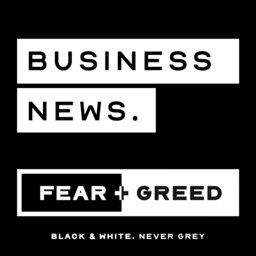Sunday feature: A step-by-step guide to dealing with a crisis
Guest: Carden Calder
Original air date: November 21, 2023
Original description: From the outage at Optus to the rolling problems at Qantas, corporate Australia has been littered with crises lately. Carden Calder, co-founder of https://www.bluechipcommunication.com.au/, talks to Sean Aylmer about the steps leaders can take to manage (and sometimes prevent) a crisis.
In 1 playlist(s)
FEAR & GREED | Business News
Daily business news for people who make their own decisions, with business journalist Sean Aylmer an…Social links
Follow podcast
Recent clips

Dividend investing: How to pick quality income stocks
06:07

Hate legislation on shaky ground; air traffic chaos; Hollywood’s highest grossing actor
15:36

Our $9 billion export that nobody talks about
05:54
 FEAR & GREED | Business News
FEAR & GREED | Business News